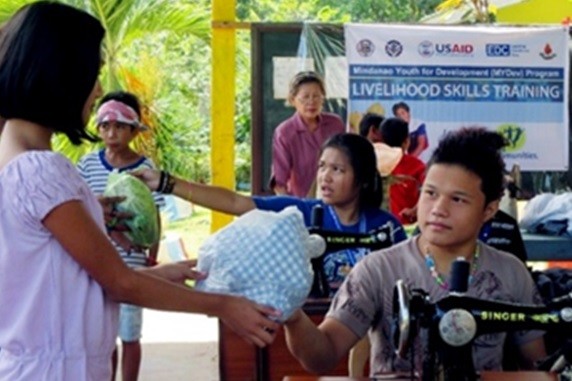Speeches Shim

Mindanao and the Sulu Archipelago comprise about one-third of the Philippines’ territory and one-quarter of the country’s total population. In spite of its significant potential for economic growth, conflict and instability discourages investment, drains government resources, and impedes development. Mindanao has the highest levels of poverty in the Philippines, weak rule of law and poor accountability, inadequate social services, and limited economic opportunity.
USAID seeks to improve peace and stability in focus areas in Central Mindanao and the Sulu Archipelago. A number of activities are implemented to strengthen local governance capacity to provide improved services and enhance the participation of civil society organizations in development planning. Activities are focused in six conflict-affected areas and their surrounding regions: Marawi, Cotabato, Zamboanga, Isabela City in Northern Basilan, Southern Basilan, and the island of Sulu.
ACTIVITIES
Enhancing Governance, Accountability, and Engagement
- Establishes partnerships between local institutions, civil society organizations, and local government units (LGUs)
- Strengthens local governments and their capacity to deliver services.
- Enhances government transparency and accountability to increase people’s confidence in government
- Expands mechanisms that facilitate public participation in governance.
- Increases civic engagement and education
- Strengthens community-driven socio-economic development
- Encourages communities to advocate for change and resolve conflicts
- Promotes youth leadership and engagement
Promoting Peace and Security in Mindanao
- Increases participation and leadership by women in the target conflict-affected areas
- Addresses land conflict in Central Mindanao to reduce tensions and reconcile conflicts related to land access, use, and ownership
- Transforms social relationships and establishes linkages among influential members of rival groups to reduce localized violence
- Builds the capacity of male and female religious and community leaders to prevent or mitigate conflict and engage in peace and development efforts
Increasing Equitable Access to Quality Education in Crisis and Conflict Environments
- Provides access to safe learning opportunities to out-of-school youth in vulnerable communities
- Enhances the life and leadership skills, community engagement and employability of at-risk out-of-school youth
- Strengthens institutional capacities of local communities through the establishment of development alliances, which ensure effective delivery of education services for out-of-school youth
- Improves education governance through decentralization, with the overall objective of improving learning outcomes, particularly early grade reading
Improving Health and Productivity
- Supports the Department of Health scale-up of high-impact services and client-centered information to improve child health and nutrition, reduce maternal and infant deaths, and decrease unmet family planning needs
- Improves the supply of integrated family health services
- Strengthens demand for essential health services
- Improves health policies and systems
- Builds public private partnerships to assure access to quality family planning and maternal and children’s health products and services
Strengthening Water and Environmental Resiliency
- Promotes sustainable access to water supply and sanitation services, and resilience to climate-related water and hydrological extremes
- Promotes an integrated ecosystems approach to conserve forest cover and biodiversity
- Improves management of biodiversity and forest ecosystems
PROGRAM IMPACTS
Local Governance Strengthened
Transparency and Accountability of LGUs Enhanced: LGUs improved transparency and accountability through participatory planning and budgeting, and the updating of revenue codes, real property tax systems and citizen charters.
Service Delivery of LGUs Improved: USG supported partner LGUs to improve health, education, water, electric, sanitation and security services.
Mechanisms that Facilitate Public Participation in Governance Enhanced: USG supported LGUs to expand public participation; with community input, they updated citizen charters, executive-legislative agendas, and community development plans.
Civic Engagement Increased
Civil Society Strengthened: USG supported capacity building, dialogues, and LGU engagement for NGOs, health, education and water committees, Ulamas, religious leaders, women’s leaders, and interfaith and village pacification committees.
Civic Education Enhanced: Community service is integrated into USAID’s Education, Governance, Environment, and Health activities. The curriculum for OSY also integrates modules on civic engagement.
Youth Leadership and Engagement Increased: More than 3,000 OSY were trained as leaders, young entrepreneurs, and peer educators to support local governance and community initiatives for peace and development.
Community Driven Socio-Economic Development Strengthened: An economic development plan was prepared to assist reintegration of IDPs in Zamboanga.


Comment
Make a general inquiry or suggest an improvement.